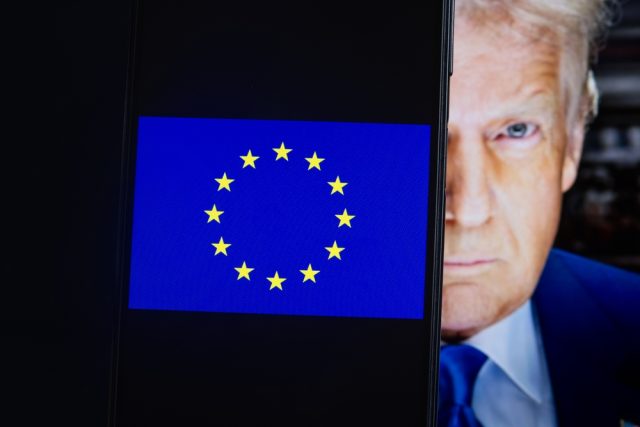
After a phone call with von der Leyen, the US president grants more time to negotiate. Markets recover, but the agreement remains uncertain
A phone call between Washington and Brussels puts the transatlantic trade negotiations back into play. Donald Trump, president of the United States, has agreed to extend the deadline for the imposition of new tariffs of up to 50% on European Union products to July 9. The one who urged the postponement was the president of the European Commission, Ursula von der Leyen, who asked for more time for “serious negotiations”.
“He called me, he asked for July 9 and I said yes,” Trump confirmed, underlining the constructive tone of the conversation. A step back — at least temporarily — that shifts the shadow of a trade war between two economic giants further away.
Von der Leyen commented positively on the exchange with the US leader, calling it “excellent” in a message published on X (formerly Twitter). “The European Union is ready to negotiate quickly and decisively. To reach a good agreement, extra time is essential,” she wrote, highlighting the urgency of avoiding tariffs that would harm both partners.
Commission spokeswoman Paula Pinho confirmed that the phone call marked a “renewed momentum” for the talks. “This is the largest trade relationship in the world,” she said, recalling how complex the ongoing negotiations are. Pinho added that European Commissioner Maroš Šefčovič would have discussed the matter with US Commerce Secretary Howard Lutnick this afternoon, demonstrating the will to proceed immediately.
Despite the postponement, ambiguous signals from the White House remain. Just a few days ago, Trump had called the EU a “difficult” partner to do business with, complaining that its proposals were “not up to par” compared to those of other countries such as India and Vietnam. In an interview with Fox News, Treasury Secretary Scott Bessent revealed the administration’s frustration: “Trump hoped that the threat of tariffs could move Brussels,” he said, adding that the threat was intended to “light a fire” under the feet of European negotiators.
Meanwhile, the extension had an immediate effect on the markets. The price of oil rose, encouraged by the reduction in the risk of trade frictions that could have slowed the global economy and reduced energy demand. On the contrary, gold lost value, a classic sign that investors perceive a more relaxed climate. The main European stock exchanges welcomed the truce: Frankfurt jumped 1.7%, followed by Milan (+1.3%), Paris (+1.2%) and Madrid (+1.15%).
Despite the apparent climate of openness, the path to a stable trade agreement remains uncertain. The 50% tariffs threatened by Trump would have a significant impact on the European economy, hitting key sectors such as the automotive industry, agri-food and luxury goods. The stakes are high, and the time window until July 9 could prove too narrow to overcome differences that have dragged on for years.
The European Commission is cautiously optimistic. “We have a very prepared negotiating team ready to act,” said spokeswoman Pinho, underlining the commitment to keeping diplomatic channels open and to building an agreement based on mutual benefit. It remains clear, however, that the final word will be up to the political leaders and their respective international agendas.
The international context adds further pressure. With other tables open — from India to some Asian countries — Trump could try to use the tariffs as a lever to obtain rapid concessions, also exploiting the internal weakness of the EU grappling with political divisions and energy crises.
The next crucial date will be July 9. Until then, Brussels and Washington will try to find a synthesis that will avoid yet another tariff clash. Diplomacy is back on the field, but the game is still all to play for.



 Subscribe
Subscribe